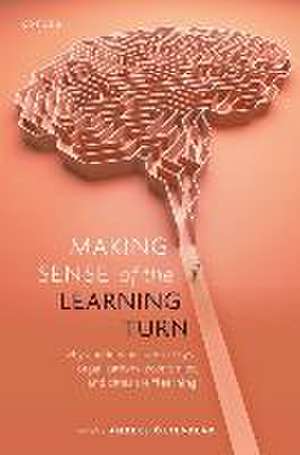Making Sense of the Learning Turn: Why and In What Sense Toys, Organizations, Economies, and Cities are "Learning"
Editat de Anders Örtenbladen Limba Engleză Hardback – 6 iun 2024
Preț: 779.96 lei
Preț vechi: 1116.54 lei
-30% Nou
Puncte Express: 1170
Preț estimativ în valută:
149.25€ • 159.60$ • 124.44£
149.25€ • 159.60$ • 124.44£
Carte disponibilă
Livrare economică 17-24 martie
Preluare comenzi: 021 569.72.76
Specificații
ISBN-13: 9780192865977
ISBN-10: 0192865978
Pagini: 480
Dimensiuni: 160 x 240 x 30 mm
Greutate: 0.86 kg
Editura: OUP OXFORD
Colecția OUP Oxford
Locul publicării:Oxford, United Kingdom
ISBN-10: 0192865978
Pagini: 480
Dimensiuni: 160 x 240 x 30 mm
Greutate: 0.86 kg
Editura: OUP OXFORD
Colecția OUP Oxford
Locul publicării:Oxford, United Kingdom
Recenzii
Making Sense of the Learning Turn is not an easy feat. Örtenblad and the other twenty authors bravely tackle this quest addressing the significance, value, and consequences of the "learnification". They chart and critically assess its turn-of-century heyday, minutiously examining and interrogating "learning" as a premodifier of such things as cities, regions, communities, toys, groups, and organizations while also tracing and heeding a warning on the emerging new words replacing it. The multidisciplinary breadth, critical depth, and clarity of this book are impressive making it a "go-to" reference for anyone interested in understanding the terms of "learning".
Insofar as data, information and knowledge have become the engines of growth in late modern societies, learning is their necessary corollary (another is "open"). Yet, strangely, for all its proliferation, we have not had systematic interdisciplinary treatments of learning across time, fields, and contexts. Now, thanks to this wonderful volume we do. Anders Örtenblad, not for the first time, has masterfully brought together several authors who provide highly illuminating analyses of "learning" as a premodifier. Their insights significantly enhance our learning about learning. This is a brilliant volume that I anticipate to make an impact.
This is an extraordinary book. Its scholarship is of the highest standards throughout, it is edited wisely to provide a coherent publication, and it is exciting, informative, original, and important in equal measure. This book opens the window of assumption, a clearing, where the essence of learning is explored, clarified, and advocated. It confronts much of the appropriation of learning as a premodifier to support other ideas rendered weak without it. The book awakens us to this and other related issues and in so doing should be welcomed and read, many times!
Insofar as data, information and knowledge have become the engines of growth in late modern societies, learning is their necessary corollary (another is "open"). Yet, strangely, for all its proliferation, we have not had systematic interdisciplinary treatments of learning across time, fields, and contexts. Now, thanks to this wonderful volume we do. Anders Örtenblad, not for the first time, has masterfully brought together several authors who provide highly illuminating analyses of "learning" as a premodifier. Their insights significantly enhance our learning about learning. This is a brilliant volume that I anticipate to make an impact.
This is an extraordinary book. Its scholarship is of the highest standards throughout, it is edited wisely to provide a coherent publication, and it is exciting, informative, original, and important in equal measure. This book opens the window of assumption, a clearing, where the essence of learning is explored, clarified, and advocated. It confronts much of the appropriation of learning as a premodifier to support other ideas rendered weak without it. The book awakens us to this and other related issues and in so doing should be welcomed and read, many times!
Notă biografică
Anders Örtenblad is Professor of Working Life Science at the University of Agder, Norway. With his keen interest in learning and education, as both phenomena and concepts, he has extensively researched and authored on the idea of the learning organization, organizational learning, and management education. He has edited numerous books and journals, including The Oxford Handbook of the Learning Organization (OUP, 2019) and The Oxford Handbook of Metaphor in Organization Studies (OUP, 2024). He is a keen advocate of research as open, academic debate.
